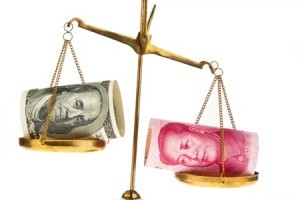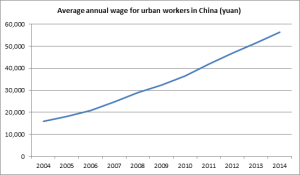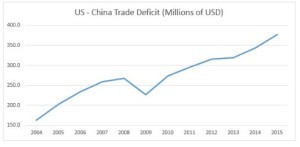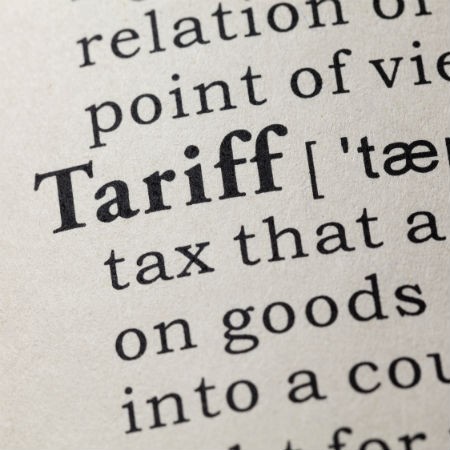In 2006, I visited Shanghai with a group of fellow students from Boston University as we wrapped up our MBA studies. While I don’t have the space to share the details of our experience here, there are two themes that stand out. First, forward-thinking American businesses had set up operations in China and were in most cases, doing quite well. Second, the Chinese labor market was huge and labor rates were very low by world standards. The Chinese economy was strong and showed no signs of slowing down any time soon. And yes, the US small business community was in peril, and following the crash of 2008, it seemed that things could not get much worse.
What a difference a decade makes. Since 2004, the average wage for urban workers in China has more than tripled (see chart below). More recently, a sluggish economy in China and a devaluation of the yuan, along with a stronger US dollar is having a profound effect on many in the small business community here. Is the news good or bad? It all depends on whether your business relies more on imports than exports.
Source: China Labour Bulletin, National Bureau of Statistics
Raymond Arth, manager of the Phoenix Faucet division of Valterra Products says that 40% of the company’s gross sales revenue comes from imported products. In an article posted on the CNBC website – Here’s how the yuan fall impacts small business – Arth states “This is just further evidence of weakening of the Chinese economy, which I think will create more leverage for us in terms of our Chinese partners to be more aggressive with pricing… we will have that ability to negotiate.”
In the same post, Jody Milanese of the National Small Business Association points out the downside of the changing economic landscape in China, pointing out that “Made in America Products” are at a competitive disadvantage in China, which hurts US exporters. She also points out that the already wide trade gap with China will likely continue to grow as a result.
So who wins here? The simple answer is that if your small business relies more on Chinese imports and does not expect to sell more products in China an increasing deficit might be welcome news. If the opposite is true, it might be a while before we see a proliferation of “Made in the USA” labels on goods purchased by Chinese citizens.
Source: United States Census – (2015 is projected based on current data and 2014 seasonal patterns)
While politicians speak of climate change while declaring not to be scientists, I would never lay claim to be an economist. But this much I know, the China of 2006 is a far cry from the China of 2015, and for many small American businesses the change might be good news when taken in the aggregate, at least in the short term.
For more information on this topic, please reach out to Genesis HR Solutions at AskUs@genesishrsolutions.com or 800-367-8367.
Genesis HR Solutions is the premier PEO provider for Massachusetts based businesses.







